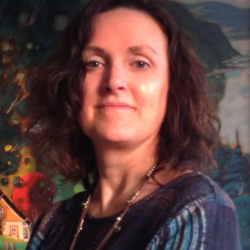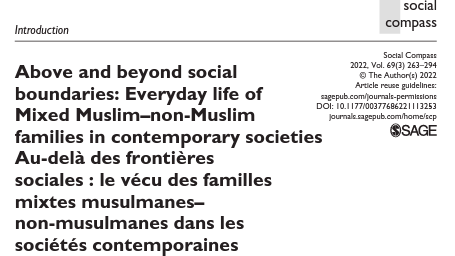Above and beyond social boundaries: Everyday life of Mixed Muslim–non-Muslim families in contemporary societies Au-delà des frontières sociales : le vécu des familles mixtes musulmanes-non-musulmanes dans les sociétés contemporaines
Social Compass
Vol. 69 / issue 3 | p. 32
This Special Issue examines the ways Muslim–non-Muslim families around the world navigate identity issues in their day-to-day life as well as the constraints of the social context that they live in. Its main objective is to address the different strategies and forms of resistance they develop in order to adapt and overcome these challenges on a daily basis. These families often incorporate numerous layers of differences (racial, ethnic, religious and class) and are thus studied as an emblematic case study of ‘mixedness’ both in public and academic debate (Al-Yousuf, 2006; Ata, 2007). One of the main aspects that makes them particularly interesting for sociological and anthropological analysis lays, indeed, in their connection with the social context where the same notion of mixedness is contextually situated and defined (Cerchiaro, 2016b). Although there is no empiric evidence to confirm it, religion, in mixed Muslim–non-Muslim families is most of the time assumed to be the most relevant conflictual dimension. However, the different contributions of this Special Issue show that the challenges experienced by some families regarding religion are not a source of concern for others and that certain contexts and settings (workplace, public sphere, extended family) are more challenging than others with respect to religion. They also highlight the agency demonstrated by mixed Muslim–non-Muslim families at the level of both identity transmission and identity formation processes.
The lack of a dedicated focus on the daily life of mixed Muslim–non-Muslim families represents a major research gap in the current literature which has contributed to the maintenance and reproduction of certain assumptions related to the supposed conflictuality of these families. What is still underexplored is how these mixed families actually cope both with the everyday experience of mixedness and with the social constraints in different social contexts. Offering the first comprehensive international perspective on mixed Muslim–non-Muslim families, this Special Issue aims to fill this gap by addressing their specific experience both in their everyday practices and in contexts where Muslims are either the majority or the minority group or live in cohabitation with other religious groups. The label ‘Muslim–non-Muslim’ aims to include all mixed families where one partner has been socialized into Islam and the other into another religious confession. With this label, we do not intend to attribute an a priori level of religiosity to the members of the couples that may vary greatly among the couples involved in the different research.
This focus on Muslim–non-Muslim families allows us to investigate ‘mixedness’ both as a socially ascribed category (which sheds light on the social perception of the minority partner and on social constraints), and as the everyday dimension of difference negotiated in the family (intercultural couple practices, identity changes, intergenerational transmission, and offspring identifications). This Special Issue deals principally with these research questions: beyond the dominant societal discourse, what are the repercussions of the social constraints for the family members? What do these processes imply in terms of identity strategies, transmission choices, and cultural and religious changes? What can the globally growing presence of these families tell us about the wider processes of secularization and integration that span contemporary multicultural societies? These important questions will be explored in this Special Issue.
Expertise
Famille, parentalité et périnatalitéMembres et équipe SHERPA

Josiane Le Gall
Chercheure d'établissement, Institut universitaire SHERPA, CIUSSS Centre-Ouest-de-l'Ile-de-Montréal

